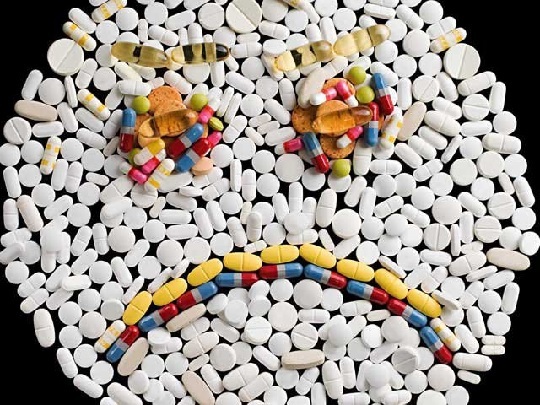The effect on the brain of antidepressants
Contents:
- General undesirable effects
- Antidepressant withdrawal syndrome
- Partial side effects of
 Antidepressants are very widely used in medicine, especially in neurological and psychiatric practice. In this regard, the question of side effects of antidepressants, which arise not so rarely, is especially relevant. All the undesirable effects of taking this group of psychotropic substances can be divided into two types: general, common to all antidepressants, and private ones, manifested only in a specific group of drugs.
Antidepressants are very widely used in medicine, especially in neurological and psychiatric practice. In this regard, the question of side effects of antidepressants, which arise not so rarely, is especially relevant. All the undesirable effects of taking this group of psychotropic substances can be divided into two types: general, common to all antidepressants, and private ones, manifested only in a specific group of drugs.
How do antidepressants affect the brain? As a rule, these drugs change the metabolism of neurotransmitters, substances that regulate human behavior and reactions. And, unfortunately, there are no antidepressants without side effects. Therefore, before starting therapy, it is very important to ask your doctor how to take antidepressants.
Should I take antidepressants? The purpose of these drugs can significantly improve the quality of life in patients with endogenous depression caused not by external factors, but by specific features of neurotransmitter metabolism. In this case, the constant intake of antidepressants is the best way of therapy.
General undesirable effects of
Antidepressants, regardless of which group of drugs they belong to, can cause the following disorders in the patient's body:
- Dyspeptic phenomena. At the initial stage of therapy, patients are very often observed disorders in the gastrointestinal tract: nausea and stool disorders( constipation or diarrhea).In this regard, antidepressants, as a rule, are prescribed in minimally low doses, gradually increasing them. This will reduce such dyspeptic manifestations. Against the background of long-term use of these drugs, there is an increase in appetite and weight gain, which can be observed in a very pronounced form.
- Violations in behavior. In some cases, patients may experience sleep disturbances in the form of insomnia or, conversely, increased sleepiness. In addition, there is a decrease in sexual desire and the opportunity to experience orgasm. These symptoms occur very rarely, and very often self-pass with further use of the drug.
- Serotonin syndrome. Very rarely there is a serotonin syndrome, manifested by severe symptoms. Its occurrence is associated with the simultaneous administration of two drugs, increasing the serotonin content in the brain. It manifests itself by changing the patient's psyche( a sense of anxiety, blurred consciousness, manic-depressive syndrome, hallucinatory delirium, down to coma).Sometimes changes in the autonomic nervous system( pain in the abdomen or chest, profuse diarrhea, fever, heart palpitations, etc.).
Important! It is very important to monitor your condition against the background of taking antidepressants and in cases of such symptoms, immediately contact your doctor to adjust the dosage of the drug.
Antidepressant withdrawal syndrome
 Prolonged intake of these drugs causes a state of a certain chemical dependence in the brain. Therefore, the abrupt withdrawal of drugs can lead to the appearance of various symptoms, outwardly similar to withdrawal from the addict: irritability and anxiety, insomnia, general weakness, etc.
Prolonged intake of these drugs causes a state of a certain chemical dependence in the brain. Therefore, the abrupt withdrawal of drugs can lead to the appearance of various symptoms, outwardly similar to withdrawal from the addict: irritability and anxiety, insomnia, general weakness, etc.
How to quit drinking antidepressants? It is necessary to gradually reduce the received dose of the drug, in no case stopping its sharp reception. The second very important question: how long can I take antidepressants? The answer to this question can be given only by the attending physician. There are cases when preparations of this group are appointed for life.
Partial side effects of
In addition to the common side effects for all antidepressants, there are also particular manifestations of a particular subgroup of these medicines. In this regard, before the treatment, it is necessary to ask the doctor which antidepressants should be taken.
Monoamine oxidase inhibitors, very often cause daytime apathy, attacks of slight dizziness, decreased pressure, increased irritability and sexual disorders.
Tricyclic antidepressants can lead to headaches, drowsiness, problems with urination, vision, and also cause dizziness. Antidepressants blocking the re-uptake of serotonin and noradrenalis cause less serious side effects: nausea, diarrhea or constipation, daytime fatigue, rare dizziness.
write the question in the form below:



